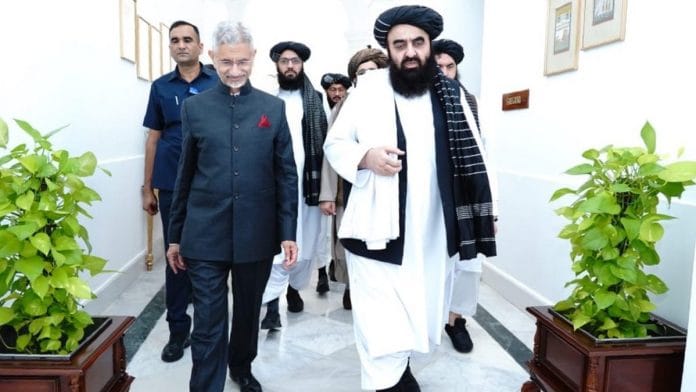The rapid turn of geopolitical events in recent weeks suggests tectonic shifts in the foreign and security policies of several countries in the region. Afghanistan foreign minister Amir Khan Muttaqi’s visit to New Delhi marked a new beginning in India-Afghanistan relations, a ‘reset’ reminiscent of former Prime Minister Manmohan Singh’s outreach during the UPA era. No government has ever had a consistent policy of being either a permanent friend or foe to the regimes in Kabul.
In July this year, Russia became the first country to formally recognise the Taliban government in Afghanistan, sparking protests from the West but generously lauded by Beijing, which suggested reintegrating Afghanistan into the international community. Moscow and Beijing’s emphasis was probably on pragmatic engagement with Kabul rather than putting a stamp of approval on all of the Taliban’s domestic policies. The 1979 Soviet invasion of Afghanistan and the humiliating withdrawal in 1989 after defeat by Afghan forces have not come in the way of Russia’s desire to renew ties with the Taliban now.
It is no secret that the US used the Taliban to defeat Soviet forces and unseat then anti-Taliban Afghan government, calling it a puppet regime. Yet, the same US had to launch Operation Enduring Freedom to punish the Taliban for sheltering terror groups that had declared war on America. As a result, the Taliban regime fell, and its leader Mullah Omar fled. Hamid Karzai then became Afghanistan’s first democratically elected president.
President Barack Obama announced financial aid to Pakistan and Afghanistan to get rid of terror networks and strengthen democracy. But after the US killed Osama bin Laden in Pakistan, three things happened: Washington began troop withdrawals, Pakistan went on the back foot, and Kabul-Islamabad started trading barbs. During Donald Trump 1.0, Washington’s Afghan policy was revised and troop withdrawal was linked to “conditions on the ground” rather than arbitrary timelines. Trump invited India to play a greater role in rebuilding Afghanistan while castigating Pakistan for harbouring insurgents. But the hasty US withdrawal resulted in the Taliban storming Kabul and forming a government.
Also read: In Great Game for Kabul, India plays a patient hand. Multi-alignment to compartmentalisation
India’s approach has been no different
Like the US, Russia, China, and the EU, India’s engagement with successive regimes in Kabul has always been guided by pragmatism and national interest. New Delhi’s recent outreach not only opens several security and strategic options but could also have far-reaching consequences for India’s approach to regional geopolitics.
By upgrading its relationship with Kabul to cover economic, trade, security and infrastructure cooperation, India has effectively busted the myth that Pakistan is indispensable to Afghanistan’s development. It has been rather foolish on the part of Islamabad to openly vent its anger on New Delhi-Kabul alignment by initiating military attacks on targets in Afghanistan, including civilian areas. Though the two countries have agreed for a 48-hour ceasefire, Kabul is not likely to forgive Pakistan or vacate the military and border posts it has captured, including those near the Durand Line.
India’s strategic interest lies in securing a strong foothold in Kabul. This can be done through infrastructure and development aid. Currently, India’s only access route to Afghanistan runs through Iran’s Chabahar Port, where China is also deeply entrenched. The overland route from Kabul to Kandahar passes through Pakistan’s Northwest Frontier Province (NWFP) and Balochistan, both simmering with discontent and separatist sentiment.
In this context, two aspects merit attention here. First, External Affairs Minister S Jaishankar, during his meeting with his Afghan counterpart, referred to Afghanistan as a “contiguous neighbour”, ostensibly referring to Pakistan-occupied Kashmir (PoK), which links India with Afghanistan, Russia, Tibet, and Central Asia via the Karakoram Pass and the Wakhan Corridor.
Second, successive Afghan regimes have never recognised the 2,640-km Durand Line as the legitimate border with Pakistan, and rightly so, since the British drew zigzag lines on their maps left 77 years ago, sitting far away from the areas they were partitioning.
Difference between engaging and endorsing
Meanwhile, the US and China both have their eyes on Afghanistan and Balochistan’s rich natural resources. In a joint press conference with UK Prime Minister Keir Starmer, Trump recently demanded that the Soviet-built Bagram Airbase be handed back to the US. Two days later, on 20 September, he followed up that demand with a pointed threat on his Truth Social platform: “If Afghanistan doesn’t give Bagram Airbase back to those that built it, the United States of America, BAD THINGS ARE GOING TO HAPPEN!!!”
Bagram airfield’s location is strategic. It connects several Afghan and Pakistani airfields within one to two hours of flight time, requiring no refuelling. This could partly explain the recent conflict between Pakistan and Afghanistan. But it would be not just foolish but a blunder for Trump to trust Islamabad to help get the Bagram airfield back for the US. It’s doubtful that Trump would trade his “peacemaker” image with a conflict with the Taliban and take the US-Afghanistan relations back by two decades. Beijing, too, is unlikely to support Pakistan in its war with the Taliban, especially after hosting the China-Afghanistan-Pakistan trilateral dialogue with a view to extend the China-Pakistan Economic Corridor (CPEC) into Kabul.
By engaging with Kabul now, without getting entangled in the Taliban’s domestic policies, New Delhi has made a strategically astute move at the right time. It is important to see the difference between engaging with Afghanistan and recognising or endorsing the Taliban’s ideological beliefs.
Seshadri Chari is the former editor of ‘Organiser’. He tweets @seshadrichari. Views are personal.
(Edited by Prashant)







However, the reputational risks should be carefully thought through. In each global forum, even those like SCO where raising bilateral issues is frowned upon, or the annual jamboree at UNGA, India flags cross border terrorism from Pakistan as a point of principle. No distinction between good and bad terrorists. Difficult to see how that can now be said with a straight face.